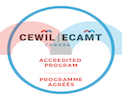Work Term Evaluations
Forms
All forms (including Employer Responsibilities, Student Orientation and Performance Support Checklist, and Employer Mid-Term Student Evaluation) are available under the forms section in our Employer Resources.
Co-op Student of the Year
Co-operative Education and Work-Integrated Learning Canada (CEWIL) annually seeks nominations for the Co-op Student of the Year Award. If you have given your student an "Outstanding" rating on the evaluation form and provide a letter of support, they become eligible for this national award.
The letter should briefly list the student's duties and responsibilities, describe how the student performed in comparison with your expectations and describe the outstanding achievements on the job which you feel warrant consideration for this award. Please email (mcs@dal.ca) your letter back to our office.
A selection committee at the Faculty of Management will select one final candidate (in January of each year) whose dossier is forwarded to Toronto for consideration at the national CEWIL level. The award brings acclaim to the student, employer and university and includes a cash award for the student.
Work Term Evaluations - Rubric and Definition of Terms
Please note that the following marking rubric is applicable until January 2026, at which time the new Undergraduate Work Term Evaluation Guidelines will come into effect.
Marking Rubric
Excellent: The student has consistently demonstrated a strong competency with this skill area; enough to impress and thrive at their work. They have exceeded expectations with respect to this skill.
Very Good: The student has demonstrated consistent competency with this skill area; enough to succeed at their job. They have met expectations with respect to this skill.
Satisfactory: The student has required prompting and support with this skill, but showed eagerness to improve, and has demonstrated competency by the end of the work term. They have met expectations with respect to this skill.
Needs improvement: This skill would be considered an area requiring improvement for the student; they may have still succeeded on their work term based on strengths in other skills areas. The student demonstrated an acceptable level of effort to improve this skill over the work term, although they have yet to demonstrate competency. The student is approaching expectations with respect to this skill.
Unsatisfactory: This is an area of consistent weakness for the student; there was not an acceptable level of effort to improve this skill over the work term, OR even with effort, the student still struggled with this skill. Overall the student was considered to have not met the expectations with respect to this skill.
Not applicable: Demonstration of this skill was not required in completion of job duties, or was not evaluated.
Definition of Terms
Section 1: Our graduates will have a solid understanding of how organizations function and create value.
Professionalism: Enthusiastic, takes pride in work, committed to accomplishing goals, appropriate work place behaviour.
Attitude: Displays a positive attitude.
Ability to learn: Fast learner, asks questions when necessary, applies past knowledge well, understands and applies terminology and concepts.
Productivity and organization skills: Effective task management, detail oriented, meets deadlines, produces high quality work.
Reliability: Regular attendance, punctual, dependable, willingness to work over-time, committed to work/team/task.
Working independently: Manages time, exercises judgment, asks questions when necessary, effectively identifies and utilizes resources.
Response to supervision: Responds to direction and feedback.
Section 2: Our graduates will be effective communicators.
Written communication: Able to present a rational argument, evidence of a clear, organized and concise thought process, proper spelling, proper use of grammar and punctuation.
Verbal communication: Clear enunciation, able to communicate message effectively, portrays confidence, able to speak to a group/one-on-one/audience.
Use of appropriate technology: Able to effectively utilize computer applications to support written and verbal communications.
Interpersonal skills in a team environment: Listens, offers opinions, respects opinions of others, performs an equal share of work, committed to getting the job done, flexible, cooperative attitude.
Section 3: Our graduates will demonstrate problem solving, initiative and critical thinking skills supported by appropriate analytical techniques
Problem solving: Able to analyze the situation, recognize a problem, identify and use resources, make recommendations.
Initiative: Able to recognize what needs to be done and exhibiting responsibility with regard to task completion with minimal supervision, self-starter, able to identify learning opportunities, seeks out projects, proactive, willingness to assist others.
Critical Thinking: makes reasoned judgements based on appropriately sourced evidence
Section 4: Our graduates will understand the importance of integrity-based management (ethical behavior and social responsibility).
Actions fit with organizations corporate values: Manifests organizational values in behaviour
Demonstration of behavior reflective of ethical practices and integrity: Acts in an ethical manner, treats others with respect, values diversity, and acts with integrity

